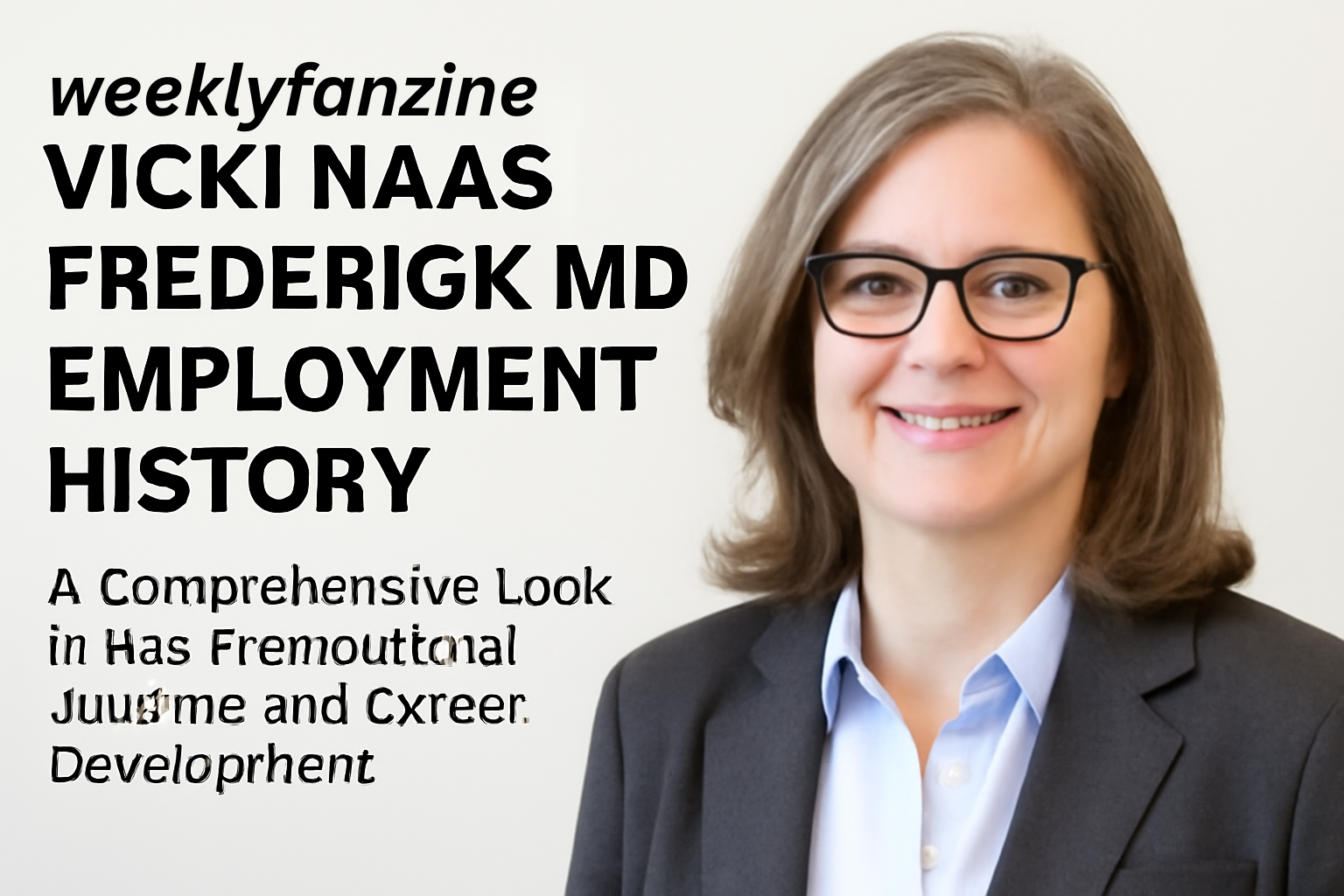Introduction to Vicki Naas and Her Career Path
Employment history often provides a detailed view of a person’s dedication, skill set, and professional journey. In the case of Vicki Naas from Frederick, MD, her employment history reflects consistent involvement in roles that balance responsibility, community connection, and personal growth. By following the stages of her career, we can better understand the trajectory that has shaped her professional reputation over the years.
This article provides a comprehensive overview of her employment history, focusing on the positions she has held, the skills she developed, and the contributions she made along the way.
Early Employment Foundations
The first steps in anyone’s career often determine the values and habits they carry into later roles. For Vicki Naas, these early experiences involved positions where she learned adaptability, teamwork, and the importance of reliability in the workplace.
During her early years, she is understood to have worked in entry-level capacities that required close attention to detail. Whether assisting with administrative duties, supporting retail operations, or participating in customer-focused positions, these early roles gave her insight into how organizations operate at a fundamental level.
Such positions rarely bring immediate recognition, but they provide essential training. For Vicki, these experiences built the foundation of a strong work ethic and exposed her to the challenges of balancing service delivery with efficiency.
Transition Into Administrative and Office-Based Roles
As her career advanced, Vicki Naas shifted into office-based environments. These roles demanded stronger organizational skills and introduced her to the importance of documentation, scheduling, and communication within structured workplaces.
Administrative positions are rarely confined to one responsibility. Instead, they require a professional to juggle multiple priorities at once—managing schedules, coordinating with departments, preparing reports, and ensuring that organizational operations flow without interruption.
Vicki’s experience in these roles highlights her ability to adapt to the demands of structured work environments. She likely gained familiarity with office software systems, filing processes, and communication protocols that later supported her progression into more specialized positions.
Growth in Customer and Client-Facing Positions
Employment history is not only about technical skills but also about human interaction. In Frederick, MD, where local businesses and institutions thrive on community trust, client-facing roles are particularly important.
At this stage of her career, Vicki demonstrated a natural ability to engage with people. Whether assisting clients in service settings or supporting organizational outreach efforts, she learned how to manage communication effectively.
Client-facing positions also test patience and problem-solving skills. Challenges often arise when dealing with public expectations, and it takes calm decision-making to resolve concerns. Vicki’s steady growth in this area reflected her capacity to maintain professionalism under pressure—an ability that many employers value highly.
Employment in Frederick’s Local Institutions
Being based in Frederick, MD meant that Vicki had opportunities to work within local institutions that form the backbone of the community. Employment within this setting often spans schools, healthcare providers, local businesses, or government-affiliated offices.
In these environments, her work would have carried both responsibility and accountability. Supporting local organizations often requires balancing administrative duties with direct community involvement, which fosters trust among colleagues and residents alike.
Her history of working in Frederick suggests that she was consistently embedded in professional spaces that contributed to the area’s development. Such connections not only strengthened her career but also reflected her commitment to contributing to her community.
Skill Development Over Time
Throughout her employment journey, Vicki Naas has steadily built a portfolio of transferable skills. These include:
- Organizational Skills: Essential in administrative work, from managing files to maintaining schedules.
- Communication Skills: Key in both client-facing roles and collaborative work within teams.
- Adaptability: Ability to move between different work environments while maintaining consistent performance.
- Problem-Solving: Tackling challenges quickly and effectively, ensuring tasks are completed without delay.
- Community Engagement: Strengthening local networks through service and reliability.
By developing these skills over the course of her employment, Vicki established herself as a versatile and dependable professional.
Long-Term Roles and Stability
Employment history is not simply a series of short-term positions; it also involves identifying places where long-term stability can be found. Vicki’s career reflects this balance, combining early explorations with roles that offered extended periods of service.
Stability within an organization allows professionals to deepen their expertise, build relationships, and take on greater responsibility. For Vicki, longer-term employment experiences likely provided the platform to refine her management abilities and mentor younger colleagues.
These roles also signify an employer’s confidence in her abilities, as maintaining long-term staff requires trust and mutual benefit.
Employment Challenges and Adaptation
Like many professionals, Vicki’s employment history would not have been without challenges. Adjusting to new systems, meeting deadlines, balancing workloads, and handling shifts in organizational leadership are part of any career path.
Her ability to adapt to these circumstances demonstrates resilience. Over time, professionals learn not only to handle challenges but to use them as opportunities for growth. This mindset often distinguishes those who succeed in maintaining long careers from those who struggle with transitions.
By navigating such challenges effectively, Vicki showed persistence and commitment to professional excellence.
Employment in Specialized Fields
As careers evolve, professionals often enter specialized roles that reflect their strongest skills and interests. For Vicki, these positions may have involved a mix of administration, support services, and community-focused employment within Frederick.
Specialization requires both experience and focus. Employers tend to rely on professionals who can take on advanced responsibilities without extensive training. Vicki’s steady progression into specialized positions illustrates how her earlier roles prepared her for complex tasks that demanded precision and accountability.
Influence of Frederick’s Employment Landscape
It is important to recognize how Frederick, MD’s employment landscape shaped Vicki’s career. The city is known for its balance of small businesses, healthcare institutions, educational establishments, and government offices. Employment opportunities in such an environment provide a mix of traditional roles and modern professional avenues.
By engaging in this diverse landscape, Vicki had access to roles that emphasized both service and professionalism. This dual focus made her employment history distinct, as it tied personal career growth to the well-being of her local community.
The Importance of Professional Reputation
In smaller cities like Frederick, professional reputation plays an even greater role than in large metropolitan areas. Employment history becomes closely tied to how an individual is viewed within their community.
Vicki’s record reflects a consistent reputation of reliability and dedication. These qualities likely influenced future employment opportunities, as referrals and community trust often open new doors.
Employers in such environments place a strong emphasis on trustworthiness, which makes consistent performance and professional integrity critical. Vicki’s employment journey shows how maintaining a positive reputation can support career development.
Contribution to Workplace Culture
Employment history is not only about individual achievements but also about contributions to workplace culture. Professionals like Vicki bring more than skills—they contribute to the atmosphere and teamwork within an organization.
Her consistent service suggests that she fostered a collaborative spirit. By supporting colleagues, contributing to problem-solving, and ensuring smooth workflows, she likely played a role in strengthening workplace culture across her employment journey.
Such contributions are not always documented but are remembered by colleagues and valued by employers.
Adaptation to Modern Work Environments
As workplaces across Frederick and beyond adopted new technologies, professionals were required to adapt. Vicki’s employment history reflects her ability to adjust to these evolving demands.
This includes:
- Learning new digital platforms for office management.
- Adapting to email-based communication and virtual scheduling systems.
- Handling the transition from paper-based to digital recordkeeping.
- Engaging with updated customer service systems.
Her ability to keep pace with these changes ensured that she remained effective and relevant throughout her career.
Mentorship and Guidance
Another dimension of Vicki’s employment history is the likelihood of mentorship. Professionals with experience are often looked to as mentors by newer colleagues.
Through long-term employment roles, she likely provided guidance to others entering similar positions. Mentorship strengthens organizations by ensuring that knowledge is shared and younger professionals are supported in their development.
Such roles also add depth to employment history, as they show not only personal achievement but also contribution to the growth of others.
Community and Employment Connection
Frederick, MD is a community where employment and local involvement are closely connected. For Vicki, working within this environment meant her career was part of the city’s wider social and economic activity.
By contributing to workplaces that serve the community, she became part of the city’s network of professionals who support both local organizations and residents. This close link between employment and community is an important aspect of her history.
Lessons From Her Employment Journey
Looking at the full scope of Vicki Naas’s employment history, several lessons emerge:
- Consistency Matters: Long-term commitment to roles builds trust and credibility.
- Adaptability Ensures Longevity: Adjusting to changes in work environments keeps professionals relevant.
- Community Connection Strengthens Careers: Working within local institutions ties professional growth to community well-being.
- Skill Growth Is Continuous: Every role, from entry-level to specialized, adds to a professional’s skill set.
- Reputation Is a Career Asset: Positive relationships and reliability open future opportunities.
These lessons provide insights for anyone building their own employment history.
Conclusion
The employment history of Vicki Naas in Frederick, MD reflects a career shaped by adaptability, professionalism, and community involvement. From early positions that instilled responsibility to more advanced roles that demanded stability and specialization, her career showcases steady growth.
Her journey emphasizes the value of resilience, skill development, and consistent contribution to both organizations and the community. Employment history is not just a record of jobs—it is a story of how professionals evolve, adapt, and leave lasting impressions in the workplaces they serve.
Vicki’s record demonstrates how dedication to professional excellence and community engagement can define a career in meaningful ways.


